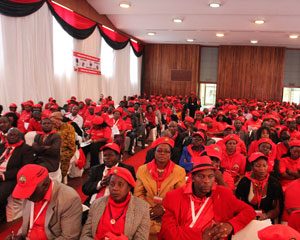
With Zimbabwe unavoidably entering a new era, there is a disturbing trend which must be nipped in the bud before it cascades into a new Zimbabwe. With about a third of Zimbabwe’s population now domiciled abroad for various reasons, the main one being the economic meltdown in Zimbabwe, it makes sense to be engaged with this constituency.
Report by Tendai Kwari
Clearly it wasn’t by choice that many of those languishing abroad find themselves in that predicament. Many long to be home with their loved ones. Yet we are witnessing a very pernicious cancer whereby those in the diaspora are now being considered a different people. They are not real Zimbabweans anymore by virtue of geography.
Despite the fact that many are entitled to Zimbabwean citizenship according to the new constitution, holding exiled Zimbabweans with suspicion and disdain continues unabated. Instead of harnessing the skills and knowledge gained abroad, Zimbabweans find themselves demonised and antagonised; their contribution is not valued. Worryingly, this is vented not at a personal, but mainly at institutional level.
Recently, this trend has reached stratospheric levels. It started with the denial of the postal vote to the many Zimbabweans abroad. Surprisingly, even the so-called democratic forces including the MDCs could not help to secure the diaspora vote despite the fact that they are part and parcel of the government of national unity. As a result, many Zimbabweans in exile won’t be voting in the most important election post-independence. Just recently, the constitutional Court threw out a case filed by an exiled Zimbabwean trying to secure the diaspora vote. What is worrisome is that even the supposed democratic forces have become part of this disenfranchisement ploy.
The fear and mistrust of the diaspora has clouded the judgement of Zimbabwean leaders and institutions to the detriment of the country. The chorus of just removing President Robert Mugabe at any cost without taking a closer look at those meant to replace him might come back to haunt Zimbabweans at some stage. Change at any cost is not progressive.
Another victim of this syndrome has been Mutumwa Mawere. After being initially harangued for not having the right identification papers, a case he eventually won after going through a lengthy process including through the courts, we witnessed diaspora bashing again when Mawere’s presidential candidature was turned down through a dubious technicality. Clearly, Mawere has more means to sustain his bid than some of the candidates.
We also witnessed the ill treatment of MDC founding member Grace Kwinjeh in Makoni Central. One can only feel sorry for her having left Europe to try and help her country. As I write, those diasporas in the MDC-T who were tired of being marginalised have grouped together to form Zimbabwe Yes We Can, an apolitical pressure group based in the UK.
- Chamisa under fire over US$120K donation
- Mavhunga puts DeMbare into Chibuku quarterfinals
- Pension funds bet on Cabora Bassa oilfields
- Councils defy govt fire tender directive
Keep Reading
To conclude, as Zimbabwe approaches a new era, it is vitally important that Zimbabweans at home work closely with those in the diaspora for the benefit of our country. Viewing exiled Zimbabweans as terrorists will not increase the fortunes of the perpetrators but in actual fact diminishes them as we all suffer the negative consequences of such treatment. We want to see diasporas head hunted and included in the new government of Zimbabwe after the elections and also occupy strategic positions in various institutions. While there are various half-hearted initiatives to try and engage the diaspora, these are not doing enough due to the reasons mentioned earlier. Zimbabwe will benefit immensely by including exiled Zimbabweans in its new vision.











